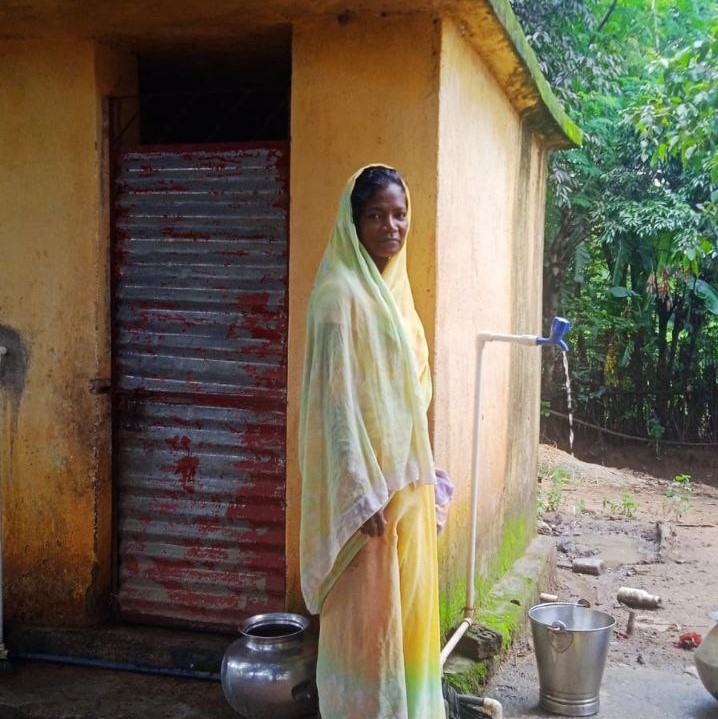Village water supply systems move communities towards better health and wellbeing
StoryBy Chandrika Patnaik
22 April 2021
Access to toilets, bathing rooms and clean water ensures safety, convenience and self-respect for village communities in Gumla district of Jharkhand.

Kilsta Dungdung, a resident of Menatoli village fetching water from the third tap.
Photograph by Govind Barik
“Walking half a kilometre in the summer heat to fetch water from the dug well was tiring and time-consuming. I spent at least two hours a day only fetching water. Add to that the time I spent going to bathe in the open, wash clothes and utensils. To defecate away from prying eyes, I had to walk half a kilometre towards the field and look for shrubs,” says Sushuma Bilum, 45, Treasurer of Pratima Mahila Mandal in Menatoli village.
But since September 2020, the Menatoli community has been telling a different story. Every household in the village started getting water through three taps. Sushuma is exuberant while talking about the difference it has made, “It changed our lives completely. I can take a bath in the privacy of my bathroom and clean myself properly. I grow tomatoes, peas, bottle gourd, and urad in my field with ease. I don’t feel tired anymore. I am able to clean my backyard and cook at my convenience. I am able to attend group meetings on time and participate in discussions.”
Bhusditoli village with 50 households and the neighbouring Menatoli village with 15 homes in the Gumla district of Jharkhand faced acute water shortages during summers. Residents walked nearly 500 metres to the field to collect water from the dug well.
Though there are two wells in the area, one dries up completely during the hot summers. The second well has little water. Residents also collected water from a well which lies between both these villages. During summers, people crowded around these wells and spent hours collecting water. These are open wells, and dirty water flows into them during monsoons.
Budheshwar Singh, 38, President of Bhusditoli Village Development Committee (VDC), says, “Apart from acute shortage of water during summers, by using water from these open wells we were exposing ourselves to diarrhoea every time. Women and children suffered a lot. The health issues spiked mostly during the rainy season when dirty water percolated into these open wells. Actually, we did not have a choice but use the water.”
In Menatoli village, Sumanti Kerketa, 36, is happy that she and her three young daughters no longer have to go outside in the dark whenever they feel the need to relieve themselves. “My husband used to get anxious each time my daughters, aged 15-10, went out to relieve themselves after nightfall.” He would ask Sumanti to accompany their daughters in the dark each time. “It made me extremely tired after a long day fetching water, cooking and looking after my family’s needs.”
The situation changed soon after they received water directly through taps at home. “We don’t have those problems anymore, and my girls are so proud of using the bathing room and toilet at their convenience. Also, guests who visit us enjoy their stay with us as water is available in taps at home freely,” says Sumanti.
In April 2021, the residents of Menatoli built a dug well with a raised concrete wall around it under MGNREGS. The water from this well is pumped into the overhead water tank. From here, it is distributed to households in both the villages.
The community completed the construction of the toilets in 2018 through the Swachh Bharat Mission-Gramin fund from the Government. “It’s not only the women in our village who are happy with water supply at home. Elders in our village take a bath and use the toilets within the comfort of their homes. I can’t tell you how happy they are,” says Budheshwar Singh.
The water tower of Bhusditoli village in Gumla district of Jharkhand.
Photograph by Govind Barik
ACKNOWLEDGEMENT
Santosh Kumar Patra, a Thematic Coordinator in Village Institutions, helped in collecting data for the story. Priya Pillai edited the story.
ABOUT THE AUTHOR
Chandrika Patnaik leads content production within the Communications team in Gram Vikas.
RELATED BLOGPOSTS
Turning losses into gains: How Mallipanka farmers find success in new crops
Reviving agriculture: Mallipanka’s first strawberry farm story.
Ensuring dignity beyond life: supporting migrant families in their darkest hours
Gram Vikas ensures safe migration and dignified repatriation for deceased migrant workers, supporting bereaved families.
Collective leadership transforms ageing overhead water tank to secure household water supply for all
Kalakhadi’s aging overhead tank revived through collective leadership, ensuring sustainable water supply for the community.